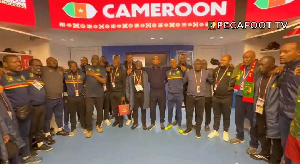S.M.L. Endeley, Paramount Chief of Buea, 91, was the first West Cameroonian to sit as a judge of the Supreme Court of Cameroon. Following are excerpts from various recent interviews he granted.
What specific role did you play in the reunification process?
Well, first of all, I must tell you that the whole progress of reuniting the two parts of Cameroon began in the 1950s when we were already grown-ups and pursuing studies either in Nigeria or in the United Kingdom as was my case. In our various institutions of learning, be it in Nigeria or Britain, there were always small Cameroonian discussion groups addressing the future of our territory; the then Southern Cameroons.
But at the real time of reunification, I was beginning my career in the judiciary, first as a lawyer and later as a judge. As you know at that time there was a very clear line between active politics and practicing as a magistrate. I later on rose to become the first chief judge of West Cameroon; but on the whole and as a judge, I watched the whole process as a judge rather than a political actor as was the case with my late brother, E.M.L. Endeley or his contemporaries such as Foncha, Muna or Jua.
You were initially a lawyer before joining the judiciary; something unusual in the then East Cameroon. You never went to the National School of Administration and Magistracy which trains magistrates today. How smooth was your insertion into the French-inspired federal judicial system of the 1960s?
Common law judges at that time were selected from the Bar. I learnt enough to be a master of situations and so I could put forth arguments after reunification to prevent the continuance of the prevailing trends in East Cameroon under which court registrars were elevated to serve as high court judges and magistrates. The statutes of the magistracy were subsequently amended on Common Law lines on my initiative; but pressure came from all over causing the President of the Republic of the time, Ahmadou Ahidjo to come back on his decision.
Over fifty years down memory lane, what would be you appraisal of Cameroon's legal system today with particular reference to the judiciary?
I think the judiciary is in difficulties. Professional calling is a challenge and honour; but I think material calling is carrying the day these days. As a judge, I had no time for extra judicial meetings with counsel but today, the judiciary has become a thing for the rich. This is a serious challenge to the world of jurists and the entire nation because the situation is scaring away potential investors from Cameroon.
My consolation however is that the English-speaking part of the country is still glorified by its judiciary; but unfortunately there is nobody there to ensure that our traditions are kept intact. For example, proper court dressing is fading away and I can no longer hear a judge telling a lawyer that "... I cannot hear you because of the way you are dressed" as was common in the courts in that part of the country.
It may sound like a trivial issue, but court dressing is an important manifestation of the desire to deliver quality justice. In fact, I fought hard to get things changed at the Supreme Court and under the leadership of the late Chief Justice of the Supreme Court, Marcel Nguini (RIP) we introduced the wigs worn today by members of that supreme jurisdiction.
There have been several attempts, successful in some cases and unsuccessful in others, to harmonise the two legal systems in Cameroon. But we know that in England which has been a unitary state since 1066, English Company Law does not apply in Scotland. Are you an advocate of legal unification?
Legal systems evolve.They grow with the political evolution of a country. You cannot compare what takes place in the UK and Cameroon. We have to choose depending on our own interests rather than just parroting. Marrying the inquisitorial system and the acquisitorial has been a very difficult exercise for us. That is why we should rather make everything uniform so as to better serve the people who should be served.
Although we are in a global village, meaning that we must learn from others; we must however remain original. For example, the government was at one time trying to close down Customary Courts in West Cameroon, but I told President Ahidjo that Customary Courts were a vehicle for the development of our law
(Interview done with additional material from the Cameroon Common Law Journal)
Actualités of Wednesday, 29 January 2014
Source: Cameroon Tribune












